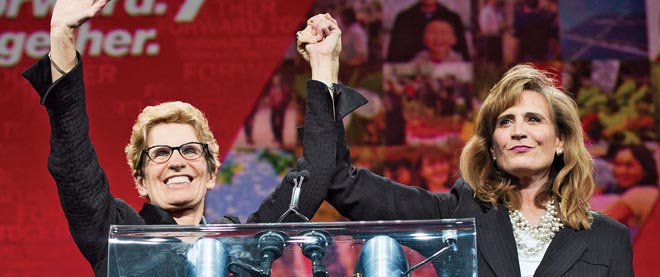Sometimes too much democracy is a bad idea
The problem with the notion that delegated conventions are less democratic
Nathan Denette/cp
Share

If the Ontario Liberal convention that just anointed Kathleen Wynne premier does end up being the last event of its kind to use delegates, we cannot say it failed to deliver drama. Most political parties have, in the name of democracy, switched to a one-member, one-vote (OMOV) system which gives no special standing to party insiders or elected legislators. The federal New Democrats used OMOV for the first time last March, abandoning their tradition of giving labour unions a specified minimum vote weight, and the federal Liberals have thrown their process so far open that voters in their current race do not even need to be full members.
This time the Ontario Liberals did things the old way, allowing for the possibility of last-minute appeals to the assembled voters, between-ballot deal-making, and suspense-filled physical migrations of defeated delegations. This process doesn’t always pay off, but the Ontario Liberal show delivered on all these promises. The first draft of history, as it now stands, says that Wynne decisively won a head-to-head oratorical showdown with rival Sandra Pupatello on the morning of the vote, convincing the party elite that Ontarians would prefer her warmer, less aggressive style.
There is an obvious problem with the idea that delegated conventions are less “democratic” than U.S.-style open primaries; namely, that we still use delegates to do the job of actually making laws for us. When it comes to choosing party leaders, we often talk of democracy as if it were an unalloyed positive good, more being better without limit or without even a diminishing of returns. But when it comes to the hard job of turning political principles into rules enforceable by violence, most of us recognize the desirability of moderating the popular will through a mediating body of expert (or at least dedicated) representatives. In making their leaderships more “democratic,” parties seem to be tacitly acknowledging that the task of deciding the leader’s identity is actually not important enough to reserve to an informed elite.
The fact is that democracy is not only a limited good, but adding more of it at one point in the political cycle can mean less of it somewhere else. This ought to be clear from Canadian history: when the authority of party leaders was given to conventions in the first place, it put the leader’s power on a footing independent of the consent of his elected caucus, and as a result our party leaders are much less accountable from week to week and month to month than their analogues in the U.K. This has led to the evolution, within our system, of presidential-style prime minister’s and premier’s offices full of very powerful unelected personnel. In effect, it has made our government more American in form without the checks and balances built into the American scheme at birth.
It is not hard to see how one-member, one-vote leadership races might lead to a decrease or an impairment of “democracy,” depending on how it is defined. Adopting OMOV is not so much an exercise in democratic-ness, per se, as it is a change in the standard to be met by the candidate; whereas in a delegated convention the job is to impress the permanent rank and file of the party, under OMOV it is simply to sell the most memberships. This, in turn, shifts power to operatives who are good at selling the most memberships. (And the issue of possible sabotage coordinated by opponents of the party’s interest is never really dealt with theoretically, except through hand-waving.)
In spite of frequent statements that the day of delegated conventions might now be past, there is nothing inevitable about it. The Nova Scotia Conservatives, for example, “turned back the clock” in 2006 after having held a one-member, one-vote telephone election in 1995. OMOV conventions are supposed to offer practical benefits beyond moral superiority by increasing the “involvement” of the public with the party. But the downside, as the Ontario Liberal party revealed by offering a counter-example, is that the convention itself becomes meaningless, providing no opportunity for an underdog candidate to seize the moment and transform the mood in the room. The mood in the room doesn’t much matter if the leader has already been picked.
There is probably no one optimum method of selecting a leader for a political party; it will depend in any case on a party’s traditions, its particular situation, and whether it has a non-negotiable ideological raison d’être. The Ontario Liberals may decide two years from now that it was a mistake to turn their decision into a highly emotional gladiator contest in an old arena. Or they may decide that such a contest actually made a better scale model for a provincial election than the equivalent of a radio call-in to win concert tickets. Either way, the notion of democracy as some holy quantum doesn’t have much to do with it.